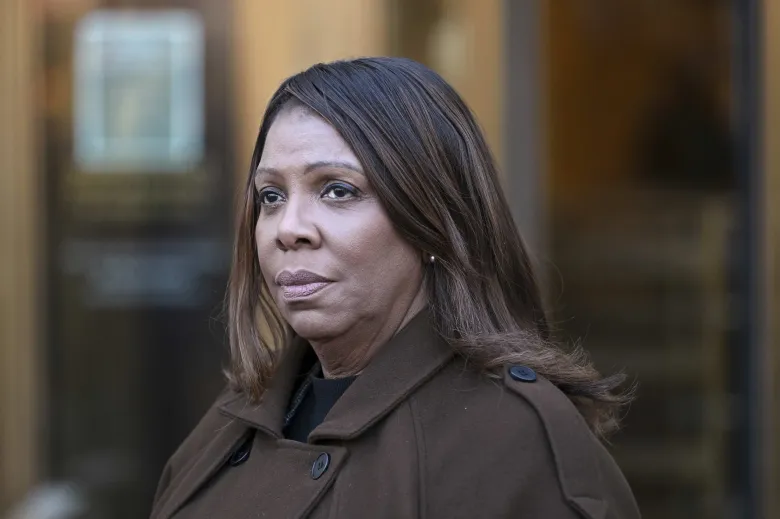Allegations surrounding New York Attorney General Letitia James have reignited debates about transparency, accountability, and integrity among public officials. At the center of the latest controversy are mortgage documents that appear to show discrepancies in how James classified her Brooklyn property when securing loans and refinancing agreements over the years.
The issue has not only drawn public attention because of the financial details themselves but also because of who James is: the top law enforcement officer in the state of New York. For years, she has positioned herself as a defender of the law and as someone unafraid to pursue high-profile cases, from investigations into corporate malfeasance to lawsuits against powerful figures, including former President Donald Trump. Now, critics say, the spotlight has turned back on her, raising questions about whether she may have broken the same rules she once enforced.
The Mortgage Agreement
According to records, on June 21, 2021, Letitia James signed a $200,000 credit line mortgage with Citizens Bank. This type of agreement, commonly known as a home equity line of credit, allows property owners to borrow against the equity in their homes.
In the mortgage paperwork, the property located at 296 Lafayette Avenue in Brooklyn was listed as a “DWELLING ONLY — 1 FAMILY.” The issue, however, lies in the fact that the official Certificate of Occupancy for the building designates it as a five-unit dwelling.
Under New York law, the distinction between a single-family property and a multi-unit property is more than a matter of description. The classification directly impacts the type of mortgage product that can be offered, the costs involved, and the level of scrutiny applied to the transaction. Properties with one to four units are typically eligible for residential mortgages with lower interest rates and fees. Buildings with five or more units are categorized as commercial properties, which carry higher costs and stricter requirements.
By listing the property as a single-family residence, the loan terms James received were reportedly more favorable than what she might have faced had the property been correctly listed as a five-unit structure. Critics argue this misrepresentation could have saved her tens of thousands of dollars in closing costs and ongoing expenses.
A Pattern Over Time
This was not the first time such discrepancies appeared in James’s mortgage history. Records suggest that since purchasing the property in 2001, she repeatedly classified it incorrectly when refinancing. For example, in August 2019—two years before the Citizens Bank loan—the property was still listed on official documents as a “four-family dwelling.”
Observers point out that the Certificate of Occupancy is considered the controlling legal authority for how a property is classified. On that document, James’s building has long been listed as a “FIVE (5) FAMILY DWELLING.”
Despite this, mortgages tied to the property consistently reflected fewer units than actually allowed, enabling James to continue accessing loans under the residential category.
Financial Implications
The financial difference between a residential and commercial mortgage can be significant. Analysts have noted that if the property had been treated as commercial, James could have been subject to an additional $20,000 to $30,000 in closing costs. These include expenses such as appraisals, surveys, title insurance, underwriting, origination fees, and specialized legal services.
Instead, the Citizens Bank mortgage documents indicate she paid just over $4,000 in fees and taxes. For a high-ranking official with legal expertise, critics argue that such a discrepancy is difficult to dismiss as a mere oversight.
Legal Ramifications
The question of legality looms large. Under New York Penal Law Article 187, mortgage fraud is a recognized criminal offense. Because the loan exceeded $50,000, the situation could potentially fall into the category of Mortgage Fraud in the Second Degree, which is a Class C felony punishable by up to 15 years in prison.
Additionally, since Citizens Bank is a federally insured financial institution, federal laws may apply. Specifically, 18 U.S.C. § 1014 prohibits making false statements to a federally insured bank, carrying penalties of up to 30 years in prison if convicted.
Importantly, the statute of limitations on such cases typically runs for 10 years. That means James’s 2021 mortgage agreement would remain actionable until June 2031.
Past Financial Scrutiny
This is not the first time James’s financial dealings have been examined publicly. Reports have previously suggested that she misrepresented her marital status in the 1980s in order to qualify for a loan. In 2011, she was also accused of underreporting the number of dwelling units at her property in order to access a government HAMP (Home Affordable Modification Program) loan.
Although those past instances did not result in prosecution, they contribute to a broader narrative raised by her critics: a pattern of bending or misrepresenting financial information for personal gain.
Political and Public Reaction
The revelations have sparked strong reactions across the political spectrum. Opponents of James have seized on the allegations as proof that she has long operated under a double standard—holding others accountable for fraud while allegedly engaging in questionable financial practices herself.
Supporters, however, urge caution, suggesting that the matter may be more complicated than it appears. They argue that mortgage paperwork can often contain boilerplate language or mistakes by lenders rather than borrowers. They also emphasize that accusations do not equal guilt and that James deserves the same presumption of innocence as any other citizen.
Still, the optics are damaging. As Attorney General, James has made a name for herself by prosecuting financial crimes and insisting that no one is above the law. This latest controversy threatens to undermine that reputation, even if it never results in formal charges.
Broader Implications
The story also touches on broader themes of trust in public institutions. When top law enforcement officials face allegations of misconduct, the public’s confidence in the fairness of the system can erode. For critics, the issue is not only about whether James personally benefited from misrepresentations, but also whether the justice system will apply the law equally to someone in her position.
Legal experts note that even if no criminal charges are filed, civil or administrative consequences could still arise. Mortgage fraud cases often involve both state and federal agencies, and financial institutions themselves may take action if they believe a borrower misrepresented key details.
The Road Ahead
As of now, James has not issued a detailed public response addressing the allegations tied to her 2021 mortgage. Whether she chooses to comment, provide documentation, or defend the classification remains to be seen. What is clear, however, is that the matter will not disappear quietly.
Journalists, political opponents, and watchdog groups are already signaling that they plan to keep pressing for answers. Meanwhile, legal analysts stress that investigations into financial misconduct typically unfold slowly, requiring reviews of documents, interviews with involved parties, and possible subpoenas.
The ultimate outcome could range from no action at all to potentially significant legal proceedings. In the meantime, the controversy continues to swirl, threatening to overshadow James’s ongoing work as Attorney General.
Conclusion
The unfolding questions surrounding Letitia James highlight how even routine financial transactions can carry enormous weight when public officials are involved. The allegations touch on issues of honesty, transparency, and accountability—values James herself has often emphasized in her public role.
Whether the mortgage records represent a simple error, a recurring pattern, or something more serious remains uncertain. What is certain is that the story has captured national attention, raising difficult questions about the balance between personal actions and public responsibilities.
For James, whose career has been built on a promise of enforcing the law without fear or favor, the scrutiny is especially sharp. As the legal clock ticks and the political consequences mount, the name Letitia James now stands at the center of a debate that blends law, finance, and politics into a controversy with far-reaching implications.

James Jenkins is a celebrated Pulitzer Prize-winning author whose work has reshaped the way readers think about social justice and human rights in America. Raised in Atlanta, Georgia, James grew up in a community that instilled in him both resilience and a strong sense of responsibility toward others. After studying political science and creative writing at Howard University, he worked as a journalist covering civil rights issues before dedicating himself fully to fiction. His novels are known for their sharp, empathetic portraits of marginalized communities and for weaving personal stories with broader political realities. Jenkins’s breakout novel, Shadows of Freedom, won national acclaim for its unflinching look at systemic inequality, while his more recent works explore themes of identity, resilience, and the fight for dignity in the face of oppression. Beyond his novels, James is an active public speaker, lecturing at universities and participating in nonprofit initiatives that support literacy and community empowerment. He believes that storytelling is a way to preserve history and inspire change. When not writing, James enjoys jazz music, mentoring young writers, and traveling with his family to explore cultures and stories around the world.








